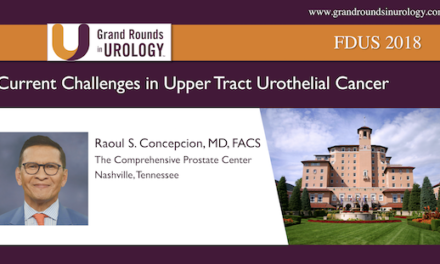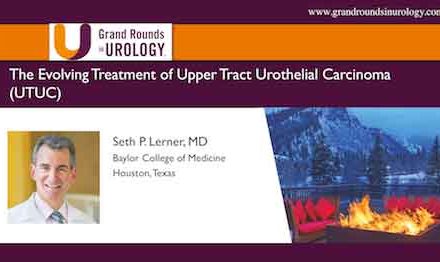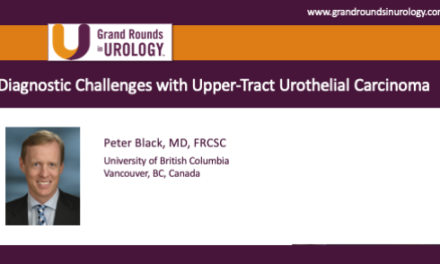Daniel P. Petrylak, MD, presented “Enfortumab Vedotin for Previously Treated Advanced Urothelial Carcinoma” for the Grand Rounds in Urology audience in April 2021.
How to cite: Petrylak, Daniel P. “Enfortumab Vedotin for Previously Treated Advanced Urothelial Carcinoma” April 2021. Accessed Dec 2024. https://dev.grandroundsinurology.com/enfortumab-vedotin-for-previously-treated-advanced-urothelial-carcinoma/
Summary:
Daniel P. Petrylak, MD, Director of Genitourinary Oncology, Professor of Medicine and Urology, Co-Leader of Cancer Signaling Networks, and Co-Director of the Signal Transduction Program at Yale University Cancer Center, summarizes his article on the EV-301 study of enfortumab vedotin and its role in making the drug a standard treatment option for patients with urothelial cancer. In 2012, Dr. Petrylak began working on a phase 1 trial of enfortumab which found that the drug had about a 40% response rate in patients with or without checkpoint surgery. He then worked on the EV-201 phase 2 trial, which found about a 40% response rate in patients previously treated with either a platinum-based chemotherapy or checkpoint inhibitor. Dr. Petrylak also worked on the phase 3 study (EV-301), which randomized patients to receive either enfortumab vedotin or standard chemotherapy and found significant overall survival benefits as well as a response rate of about 40% in the enfortumab arm. By confirming phase 1 and phase 2 data, this study earned enfortumab vedotin accelerated FDA approval. Dr. Petrylak does note that the drug has some side effects, including neuropathy and rashes. The video ends with a question and answer session conducted by E. David Crawford, MD, Editor-in-Chief of Grand Rounds in Urology. Drs. Petrylak and Crawford discuss plans to use enfortumab vedotin earlier in the treatment process, and Dr. Petrylak observes that many studies are working on exactly that, including one looking at using this drug with pembrolizumab as a first-line treatment.
For more from Dr. Petrylak on clinical trials in this area, view his discussion on enfortumab vedotin from last year.
ABOUT THE AUTHOR
Daniel P. Petrylak, MD, is currently Director of Genitourinary Oncology, Professor of Medicine and Urology, Co-Leader of Cancer Signaling Networks, and Co-Director of the Signal Transduction Program at Yale University Cancer Center in New Haven, Connecticut. He is a recognized international leader in the urology field. He earned his MD at Case Western Reserve University School of Medicine in Cleveland Ohio. He then went on to complete his Internal Medicine Residency at Albert Einstein College of Medicine/Jacobi Medical Center in the Bronx, and his fellowship at Memorial Sloan Kettering Cancer Center in New York.
Dr. Petrylak has served as principal investigator (PI) or co-PI on several SWOG clinical trials for genitourinary cancers. Most notably, he served as the PI for a randomized trial that led to the FDA approval of docetaxel in hormone refractory prostate cancer. He also helped to design and served as PI for the SPARC trial, an international registration trial evaluating satraplatin as a second-line therapy for hormone refractory prostate cancer.
Dr. Petrylak served on the program committees for the annual meetings of the American Urological Association from 2003-2011, and for the American Society of Clinical Oncology from 1995-1997 and 2001-2003. He also has served as a committee member for the Devices and Immunologicals section of the FDA. He has published extensively in the New England Journal of Medicine, Journal of Clinical Oncology, Journal of the National Cancer Institute, Cancer Research, and Clinical Cancer Research.





